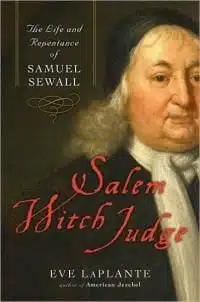
By undergoing seismic change, many men and women have repeatedly disproved F. Scott Fitzgerald’s plainly empty assertion that there are no second acts in American lives. In the case of Samuel Sewall, his later years turned out to be an act of contrition.
Sewall, the devout and prosperous Puritan whose diligently kept and richly detailed diary gives us an unrivaled view of life in colonial New England in the late 17th and early 18th centuries, would be the first to agree that his role as a judge in the Salem witch trials called for heavy penance.
In her affectionate and affecting retelling of Sewall’s story, Eve LaPlante, a direct descendant of the jurist, offers us a refreshing contrast to the recurrent political theater of our time, when public men caught in flagrant abuses of power trot out self-serving evasions. Instead of the selective amnesia of Alberto Gonzalez and the spread-the-blame-around passive voice of “Mistakes were made,” we can contemplate the rewarding, if painful, process of a man assuming full and sole responsibility for a terrible mistake.
In the paranoid summer of 1692, Sewall joined the other trial judges in a special court in condemning 20 men and women to death for witchcraft. Nineteen were hanged and one subjected to the barbaric cruelty of being pressed to death under heavy stones. The evidence was flimsy, often absurd, and the Salem witch case would forever stand as an emblem of state injustice.
Five years after the executions, Samuel Sewall stood up in his church and bowed his head as his minister read his apology. Sewall wished to accept “the blame and the shame of it.”
Otherwise, his 1,000-page diary, which he kept from his student days at Harvard until the year before he died in 1730, is sparse on the matter of the Salem trials. LaPlante gives as much context as she can and suggests that the turn in public opinion against the witch trials did much to precipitate Sewall’s repentance.
His sense of guilt and shame came at the midpoint of an energetic, successful and deeply devout life. Sewall was born in England in 1652 and immigrated with his family to the colonies at the age of nine. The Sewalls were already affluent before he married the daughter of Boston’s wealthiest merchant and began his career in the law and government.
For LaPlante and, of course, her readers, Sewall’s reticence about the Salem case in his diary is a source of frustration. It is to some extent compounded by Sewall’s tendency to think of everything that happened in his life in terms of his profound religious faith and his ongoing struggle toward salvation.
Whatever the impulse that produced his plea for forgiveness, Sewall remained the only one of the trial judges to admit to the miscarriage of justice. The very act of open confession to his community seems to have had a catalytic effect. He remained a pillar of the establishment in colonial New England and he continued to work as a judge. But his attention and sympathies turned to those less fortunate — especially the victims of the thriving slave trade.
LaPlante deftly sketches the background to the publication of The Selling of Joseph in 1700, in which Sewall proposed religious arguments against the slave trade in the colonies. It was the first abolitionist tract printed in the New World. Sewall deepened his unpopularity with his peers by also championing the rights of women and American Indians.
If you visit the Massachusetts State House today, you will find a mural depicting Sewall’s apology. Perhaps we will never know all the reasons behind it, but LaPlante’s portrait of a man whose second act became one of atonement as well as contrition is finely drawn and surely as close as we can hope to get.
